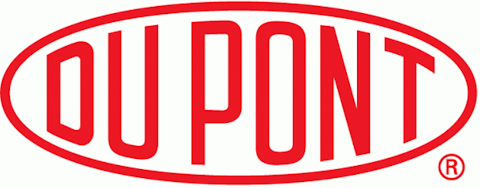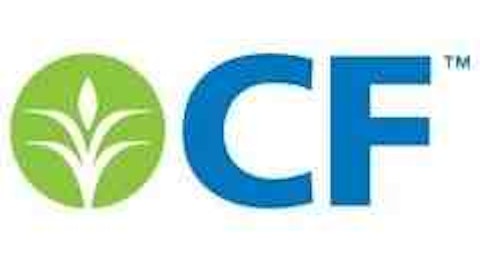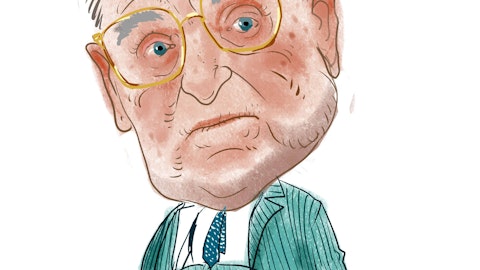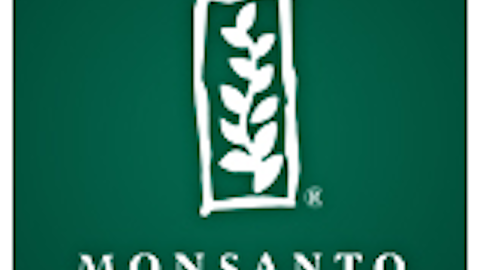E I Du Pont De Nemours And Co (NYSE:DD) CEO Ellen Kullman affirmed, “We love all our investors,” during a CNBC Squawk Box interview when asked about billionaire investor Nelson Peltz’s big stake in the company.
Although Peltz hasn’t confirmed his stake, CNBC’s Andrew Ross Sorkin said he had confirmed that Peltz was continuing to buy a large stake in the chemicals giant. Peltz, head of Trian Fund Management, reportedly wants the company to split off tje Performance Chemicals division. Kullman confirmed the company is already seeking to sell the division.
The stock is trading near 52-week highs, rising almost 5% since its second quarter results in July. E I Du Pont De Nemours And Co (NYSE:DD) offers a 3% yield, and several analysts prefer it as an agricultural play to Monsanto Company (NYSE:MON). Last week, UBS added it to its acronymic mouthful QGARP list (quality growth at a reasonable price) with a price target of $64.00.

Break up and we’ll love you more
The market seems to love the idea of a sale, and short interest has been declining. Return on investment is at 18.8%, more than twice that of the industry, and higher than the company’s five-year average of 14.3%.
If, and this is a big if, the company can jettison the Performance Chemicals business, that would leave the agriculture segment contributing over 75% of revenue. E I Du Pont De Nemours And Co (NYSE:DD)’s estimated growth rate of over 13.99% for the rest of the fiscal year would be extremely profitable without the drag of performance chemicals. Gross margin is at 33.9%, higher than the industry average at 27.20%, and could expand dramatically. This segment also has competition from Huntsman and Dow Chemical.
DuPont operates in several divisions besides Performance Chemicals. The others are: Agriculture, Electronics and Communications, Industrial Biosciences, Nutrition and Health, Performance Materials, Safety and Protection, and Pharmaceuticals.
The company has already started sloughing off weaker divisions with the sale of Performance Coatings to the Carlyle Group for $5 billion. And E I Du Pont De Nemours And Co (NYSE:DD) is focusing more on its Chemical and Seed division with a recent 80% stake in Pannar Seed of South Africa. Aside from Agriculture, the only divisions that posted income growth in the first quarter were Performance Materials and Industrial Biosciences, both at 5%.
How much do ya’ love shareholders, DuPont?
The company consistently raises dividends and easily covers with a payout ratio of 36%. The dividend for 2010 and 2011 was $1.64, raised to $1.70 in 2012, and $1.76 for 2013. One would hope Peltz would agitate for a significant dividend hike after the sale of Performance Chemicals.
Since 2010, Monsanto Company (NYSE:MON) has raised its yield four times including a 14.7% increase (announced August 6). Monsanto is also a Dividend Aristocrat, having raised the dividend for 25 or more consecutive years. Assuming a E I Du Pont De Nemours And Co (NYSE:DD) divestment of Performance Chemicals, Monsanto Company (NYSE:MON) and Syngenta AG (ADR) (NYSE:SYT) would become its most direct competitors.
While E I Du Pont De Nemours And Co (NYSE:DD)’s price to sales isn’t bad at 1.47, you are paying more than the chemicals industry average of a $1.26 for a dollar’s worth of the company’s sales but less than Monsanto Company (NYSE:MON)’s 3.43 price to sales – higher than its agricultural product industry average of 2.35. You’ll pay $2.60 for $1.00 of Syngenta AG (ADR) (NYSE:SYT) sales. Jettisoning E I Du Pont De Nemours And Co (NYSE:DD)’s Performance Chemicals would have a DuPont price to sales at lower than the ag industry average
While Monsanto Company (NYSE:MON)’s yield may not be as high, its payout ratio at 31% is lower. It is also buying back $2 billion worth of shares over the next three years. DuPont announced last December it would buy back $1 billion worth of stock in 2013. DuPont has the lowest corporate governance risk rating with a shareholders rights of 1 (very good) according to Institutional Shareholder Services.
Time to change partners?
Monsanto Company (NYSE:MON) reported third quarter results affirming its guidance for 20% plus earnings growth. This makes its third year of earnings growth and is guiding 14% for 2014. Monsanto operates in two segments: Seeds & Genomics and Agricultural Productivity. Sales for both were up in the first nine months of its fiscal year.
Syngenta AG (ADR) (NYSE:SYT) is interesting as it gets little press or analyst coverage. Only four analysts cover Syngenta AG (ADR) (NYSE:SYT) (2:30 a.m. EST conference calls are probably a factor) with a median price target of $83.02. It offers a 2.10% yield, (higher than Monsanto), and at a 36% payout ratio like E I Du Pont De Nemours And Co (NYSE:DD).
Like Monsanto, the Basel, Switzerland headquartered company is a pure agriculture play. Its sole focus is on products to enhance global crop yields and food quality. Three year dividend growth, while not as robust as Monsanto, is still a healthy 17%.
One advantage over Monsanto Company (NYSE:MON) is less headline risk, as pointed out by fellow Fool Mathew Frankel, noting the company was honored by the Dow Jones Sustainability Index as an environmentally responsible chemical company. Unless you’ve been hiding in a fallout shelter, you are probably aware Monsanto has been in the headlines for its GMO seed traits and pesticides. DuPont has managed to skirt most of this unfavorable press. Like DuPont, Syngenta AG (ADR) (NYSE:SYT) has purchased an African seed company, (MRI Seeds of Zambia), in an effort to expand its reach into emerging markets.
So choose an ag already
According to Syngenta AG (ADR) (NYSE:SYT) CEO Michael Mack, “There is broad acceptance of the need to double global crop production by 2050 in order to meet rising demand from population growth, dietary change and biofuels.”
DuPont is a buy if you believe it will sell off Performance Chemicals (and possibly Electronic and Safety Protection). If you really loved your shareholders, you would do it, DuPont.
Monsanto has many good qualities: better growth, rising yield, and a global agriculture focus. Headline risk casts it as the bad boy of this investing triangle.
The article This Company Loves You…Should You Love It Back? originally appeared on Fool.com and is written by AnnaLisa Kraft.
AnnaLisa Kraft has no position in any stocks mentioned. The Motley Fool has no position in any of the stocks mentioned.
Copyright © 1995 – 2013 The Motley Fool, LLC. All rights reserved. The Motley Fool has a disclosure policy.





